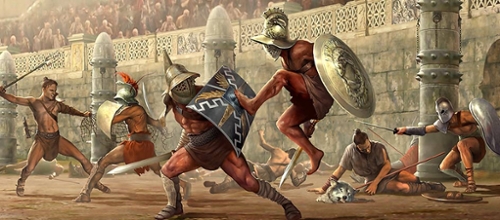2016: Battles and Bloodsports: Portrayal of Death and Violence in the Ancient Mediterranean World
 On April 16, 2016, the graduate students in the Ancient Greek & Roman Studies MA Program hosted the third-annual Graduate Student Symposium, Battles and Bloodsports: Portrayal of Death and Violence in the Ancient Mediterranean World.
On April 16, 2016, the graduate students in the Ancient Greek & Roman Studies MA Program hosted the third-annual Graduate Student Symposium, Battles and Bloodsports: Portrayal of Death and Violence in the Ancient Mediterranean World.
Event Details
-
Hosted By: The Ancient Greek and Roman Studies MA Program, Department of Classical Studies, Brandeis University
-
Date: Saturday, April 16, 2016
-
Keynote Speaker: Professor Kathleen Coleman
Professor Coleman is the James Loeb Professor of Classical Studies and Director of Undergraduate Studies at Harvard University, as well a Senior Research Curator at the Harvard Art Museums. Professor Colemen will analyze inscriptions and visual representations of gladiatorial combat in order to assess the strategies employed to accommodate the reality of defeat in Roman bloodsports.
More About the Symposium
In the ancient Mediterranean world, warfare was a common element as cultures competed for land, resources, and control. With the strength of well-trained, professional armies and the advancement in technology, military commanders were able to conquer and control large portions of the Mediterranean basin and beyond. In a world where battles were commonplace, the living commemorated the conflicts and glorified the dead.
The ancient Greeks understood the importance of war preparation. The incorporation of athletic events into daily life prepared young men for the physical demand of battle and ultimately became common in the city-states in Greece. While localized training and events pervaded Greek culture, athletic competition between city-states eventually gave rise to the Olympic games. The games not only provided entertainment for the spectators, but also focused on elements of war and the competitors’ readiness for combat. The events included, but were not limited to, πυγμαχία (boxing), πάλη (wrestling), κέλης (horse-racing), ἁρματοδρομία (chariot-racing), and the παγκράτιον (pankration).
In addition to the Greeks, other ancient Mediterranean cultures simulated warfare as a means of entertainment. During the Roman Republic and Imperial periods, politicians and emperors utilized the popularity of bloodsports to garner support. Bloodsports not only included games and mock battles, but also gladiatorial combat, public executions, recreations of mythological stories, and beast hunts.
The Ancient Greek and Roman Studies Graduate Conference hopes to encourage other scholars within the Greater Boston area and beyond to participate in a discussion, which bridges disciplinary boundaries regarding battles and bloodsports in the ancient world.